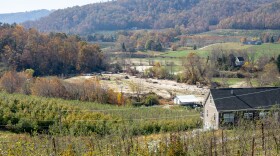Researchers at North Carolina A&T State University are using artificial intelligence to help prevent animal-vehicle collisions. In the U.S., up to 2 million crashes occur every year between vehicles and animals - causing about 200 deaths, according to data from the U.S. Department of Transportation. The study primarily focuses on rural communities across North Carolina.
The core part of the project uses sensors to detect if an animal is coming, and the warning is sent to a visual dashboard for a person driving a simulated car to see. It was funded partially by a $15 million grant spread over 5 years from the U.S. Department of Transportation.
N.C. A&T professor Ali Karimoddini is the lead researcher. He said they have discovered many barriers in rural areas when dealing with animal-vehicle collisions, like with farming vehicles.
“A farming vehicle that is slowing the traffic sometimes creates different types of challenges,” Karimoddini said. “So even flooding right? It has less digital infrastructure to alert the drivers about flooding in certain rural communities.”

Right now, the study is currently in its early stages. But, Karimoddini said they have gathered a lot of data.
“We are collecting information about how fast the driver can react under different situations, under different weather conditions, or different lighting conditions, and what type of weather,” he said.”
Karimoddini said they are also collecting information about the way the driver presses the brake and pay attention to the animals crossing the road. He said moving forward, they hope to choose rural communities in North Carolina for a pilot, and do it across the country as well.







